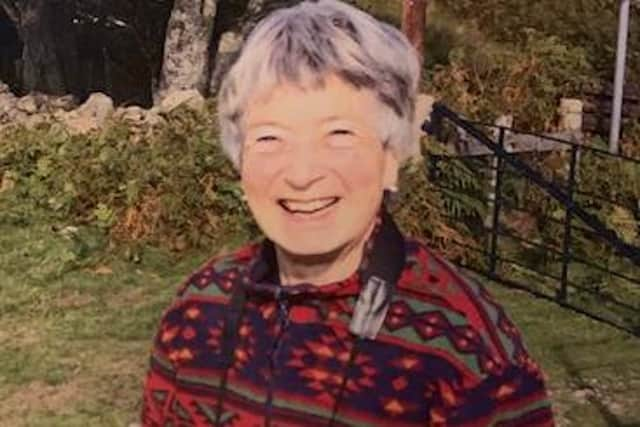Obituary: Mary Hartnoll, director of social work and first chair of the Care Commission


Mary Hartnoll was a down-to-earth social worker who rose to the top of her profession with the ethos that society should be fair and equal, with opportunities and support open to all.
Very occasionally it got her into hot water – she was at the centre of a storm over a remark about drugs – but her philosophy was that whatever mistakes people made they could be helped to rectify them with assistance, encouragement and honesty.
Advertisement
Hide AdAdvertisement
Hide AdA woman of principle and compassion, she had a quiet energy and vision, coupled with an occasionally stubborn streak, that got things done whether that was in the North-east corner of Scotland, in Europe’s biggest social work role in Strathclyde or heading up the fledgling Care Commission post-retirement.
Born in Bristol, one of four children to Margaret and Sidney Hartnoll, a pastor for the deaf, she learned sign language as a youngster and attended the city’s Colston School for Girls.
An exemplary pupil, she developed a lifelong love of nature, wildlife, the outdoors and travel and would later become an enthusiastic globetrotter.
She studied sociology at university in Bedford, at a women’s college that was part of London University and, after gaining a BA, took a post-graduate social work course at Liverpool University.
Her first post in the profession was as a child care officer with Dorset County Council. She later moved to Berkshire County Council in Reading where she was divisional director of social services.
There she started a professional fostering scheme for children – which she would later introduce in Grampian Region – and liked to be involved in a personal way, maintaining her own caseload until 1971 when most of her time was taken up by administration.
Grampian Regional Council recruited her as their social work chief in 1978, the first woman to hold the position, and she gained the respect of councillors, officials and media alike.
She also served on various national working parties and review groups and was president of the Association of Directors of Social Work from 1984-86.
Advertisement
Hide AdAdvertisement
Hide AdHer work was recognised when she was made firstly an MBE and then a CBE, the latter in the 1990 New Year’s Honours List.
After 15 years in Aberdeen Miss Hartnoll went on to become director of social work at Strathclyde Region – a huge undertaking with responsibility for 22,000 staff and an annual budget of £390 million. Local authority re-organisation saw her move to the same post at Glasgow City Council where she remained until retiring in 1998.
Two years earlier she had sparked controversy when, in a leaked memo on Glasgow-wide drugs initiatives, she suggested matter-of-factly that Ecstasy was “relatively safe” and “safer than aspirin”.
It was just a few months after the death of 18-year-old Leah Betts, who had taken an Ecstasy tablet, and there was a furious backlash and calls for her to resign. However she stressed she could never condone the taking of Ecstasy or any other drug and believed tough law enforcement was essential.
She had made the statement while calling for harm reduction measures – initiatives which are commonplace today – in the face of widespread drug use and defended her honesty, keeping her job in the process.
Remaining dignified throughout the furore, she was clearly taken aback by the reaction and the pursuit of her by the media.
Despite her busy and demanding working life she returned to Aberdeen, a city she loved, each week to relax.
And it there she chose to spend her retirement although it was, initially, fairly short-lived. In 2001 the Scottish Government appointed her as the first chair of the Scottish Commission for the Regulation of Care, known as the Care Commission, now the Care Inspectorate.
Advertisement
Hide AdAdvertisement
Hide AdShe oversaw the early years of the regulatory body and said it was the challenge of leading a brand new organisation that had lured her out of retirement.
A more permanent retirement in 2006 allowed her to spend more time with family and friends and enjoy trips abroad where she indulged in her hobbies of birdwatching and walking, as well as immersing herself in local culture.
Her favourite destinations were Nepal, Russia, Egypt, Jordan, Alaska and the Galapagos Islands.
A patient and fair woman, with integrity and genuine concern for others, she was generous with both her time and practical support for family members and the wider community.
She gave a considerable slice of her income to charities from the arts in the UK to Greenpeace, bird and wildlife organisations and to others for less fortunate people in society both at home and abroad.
She also left substantial donations to the RSPB and Wildlife for Scotland.
Latterly she was afflicted by Alzheimer’s and died in a care home in Aberdeen. Predeceased by her brother Alan, she is survived by her brothers Richard and Philip, her close companion Tom and nieces and nephews Zoe, Christopher, Reuben, Ruth and Noah.
Comments
Want to join the conversation? Please or to comment on this article.